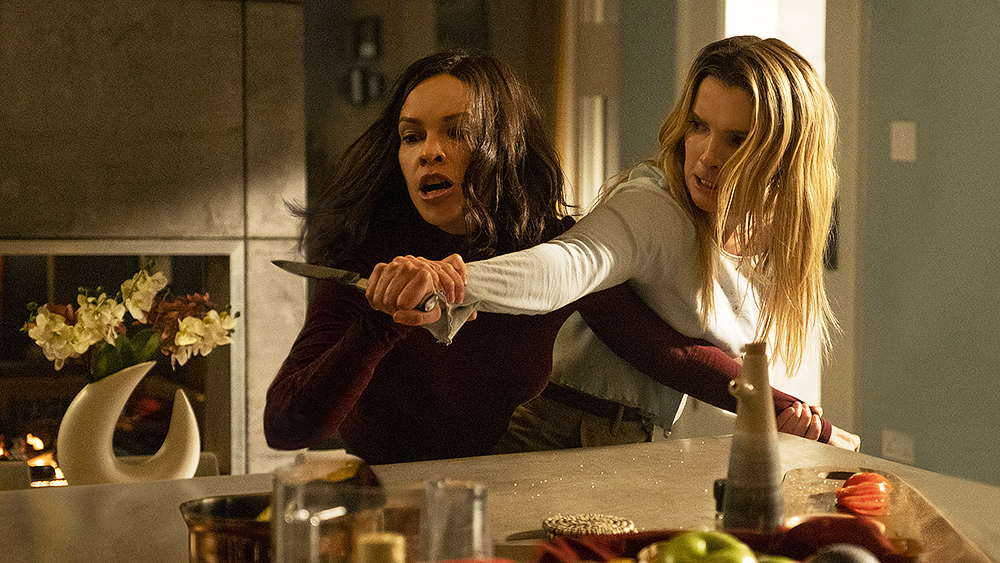The Hunt’s poster features the tagline “The most talked about movie of the year is one that no one’s actually seen. Decide for yourself”. This, of course, is a reference to the controversy which surrounded the film’s initial release date in September 2019. In the wake of two mass shootings in the US, the release of The Hunt was postponed. The revised release of the film gathered further controversy when prominent figures in the US – including President Trump and some conservative media outlets, many of whom admitted they hadn’t even watched the film – criticised it for the supposed justification of the slaying of conservative Americans. The Hunt finally got its theatrical release in March 2020, but one week later was moved to streaming platforms owing to social restrictions after the outbreak of COVID-19.
The film’s storyline is quite simple: wealthy “liberal elites” play a game in which they hunt and kill working-class conservatives for sport. The Hunt isn’t designed to be taken literally; it’s a social satire and commentary on contemporary American society and the political divisions which exist today. The film opens with a shot of a phone displaying the text message “Nothing better than going out to the manor and slaughtering a dozen deplorables”. This immediately gives the film a political context by referring to “the basket of deplorables” phrase used by Hillary Clinton in her 2016 presidential campaign, describing some of her rival candidate Donald Trump’s supporters.
The Hunt is just the latest instalment of cinema’s regular telling of the story of humanity’s willingness to hunt each other for sport: Battle Royale, The Hunger Games, and Series 7: The Contenders are amongst the films to have used this narrative before. These films (and others of course) are satires which aim to mock and draw attention to a topic by poking fun at it and often playing on pre-conceived beliefs and stereotypes. A major issue in The Hunt‘s ability to be a cutting and clever satire however is that its social references are far too obvious and nowhere near as cutting as they should be. Whereas another social satire from recent years, Jordan Peele’s Get Out, was very successful in making the audience feel uneasy about their own position, The Hunt divides its two sets of characters into two-dimensional caricatures. The liberal hunters are wealthy and complain about climate change, whereas the hunted conservatives are conspiracy theorists. The only character who doesn’t fit into one of those groups – Crystal, played by Betty Gilpin from the TV show GLOW - is our main protagonist. By virtue of her being given much more screen time and some character development, the audience root for her to survive the madcap, violent game.
The Hunt clearly has some things to say politically, and some praise should be given for its willingness to tackle contemporary concerns. However, it doesn’t make comments anywhere near often enough for it to be a groundbreaking satire, and worse still it is sometimes unclear what point it is trying to make. One of the film’s central comments is that neither the liberals or the conservatives are concerned with facts; both sides simply want other people to confirm their beliefs. It also comments on how society is willing to turn other people into their enemy. Yet something about the underdeveloped characters in the film doesn’t ring true: are we really supposed to believe that the liberals - who are so easily upset at the high amount of sugar in soft drinks or gendered language - would suddenly start killing people for sport? In fact, viewers who are seeking a much more authentic and meaningful satire should watch the recently released Brazilian film Bacurau. Using a premise which could be straight from a Black Mirror episode, Bacurau is much more successful than The Hunt in dealing with similar themes, and plays with audience expectations and genre conventions throughout.
The final act of The Hunt is very predictable indeed. The only aspect which might surprise some viewers is that the main liberal antagonist, Athena, is played by Oscar winner Hilary Swank. Shot exclusively from behind (therefore hiding her identity), Athena’s big reveal is underwhelming and serves little purpose other than to expose the identity of the actor, not the character. This is by no means The Hunt’s biggest flaw though: by not picking which side of the political fence it wants to sit on, the film doesn’t feature much more than superficial violence. By not humanising either side, it avoids making any impact whatsoever. Ultimately the film’s main crime is that it’s a political satire that isn’t overtly political, nor a biting satire.




